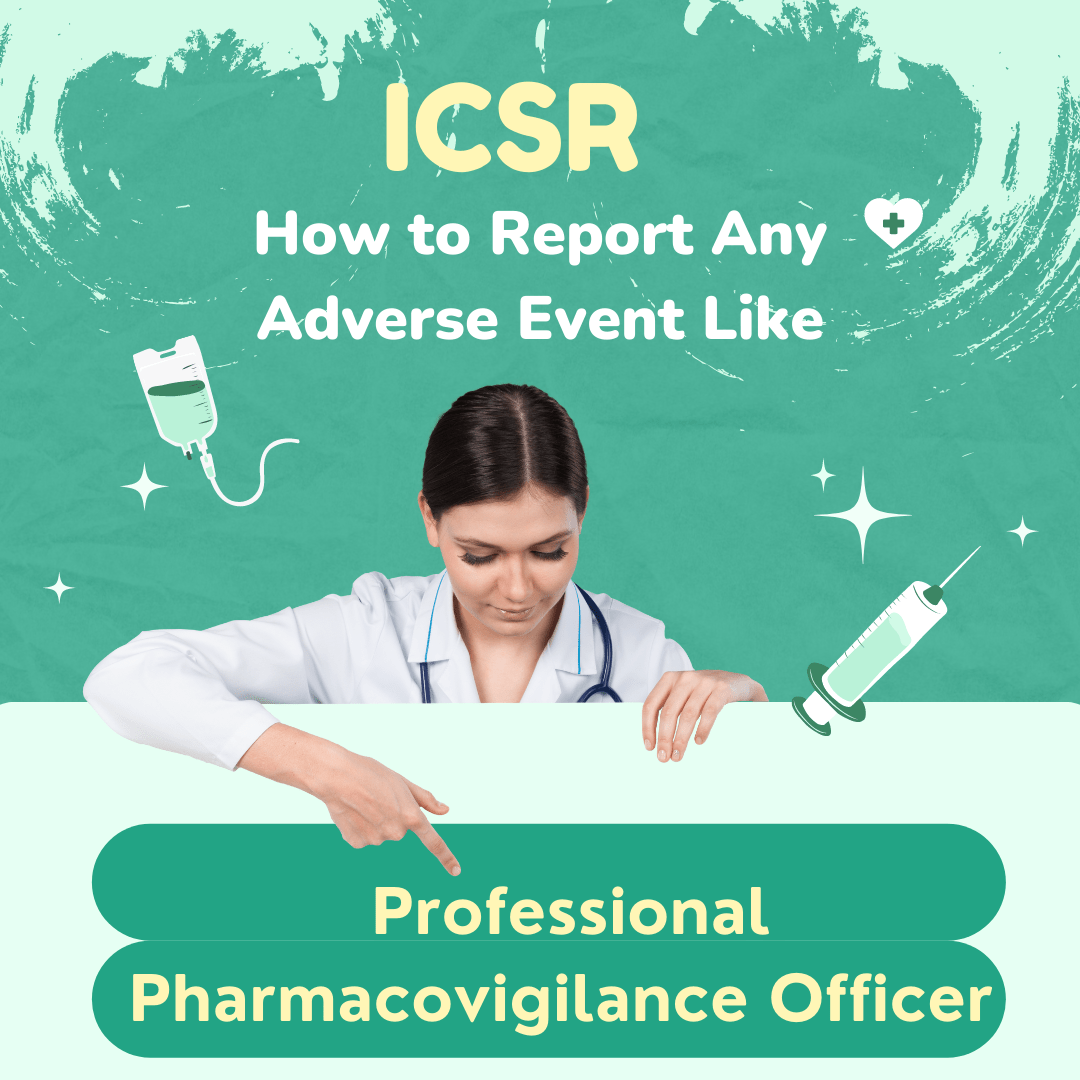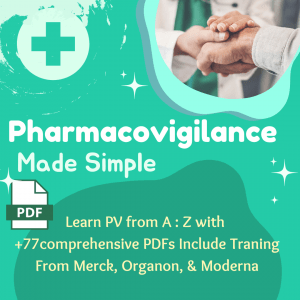ICSR Pharmacovigilance | Individual Case Safety Report Online Training
Original price was: 59 $.19 $Current price is: 19 $.
✔️ 30 Minutes Video ICSR Pharmacovigilance Traning
– Step by Step on how to report medicinal products or medical device adverse events for any case study according to FDA guidelines.
✔️ Educational Pharmacovigilance PDF Materials about drug safety such as
- Individual Case Safety Report to fully understand what it is adverse events reporting in post marketing.
- Case processing PDFs about drug safety.
- Drug lifecycle PDFs.
✔️ Free Bouness, FDA & EMA regulatory authorities PDFs according to regulatory reporting.
Description
ICSR Pharmacovigilance – Individual Case Safety Report (ICSR) Pharmacovigilance Traning
Healthcare professionals can play an important role in keeping patients safe by monitoring the benefits and risks of medical products. The Individual Case Safety Reports (ICSR) is a tool that can help them to identify potential adverse drug reactions (ADRs).
The ICSR is a confidential report that is sent to the manufacturer of a medical product when a patient experiences a serious ADR. The report helps the manufacturer to monitor the safety database of their products and to take action to improve patient safety, if necessary.
If you are a healthcare professional and you suspect that a patient has experienced a serious ADR, you should report it to the manufacturer using an ICSR.
This is video-based training, but if like to read you can buy the best 77 Pharmacovigilance PDF Materials
How should You Learn How to Report (ICSR)?
ICSRs are essential reports for monitoring the safety of medicines and vaccines.
ICSRs help to identify potential safety concerns early on, so that steps can be taken to mitigate the risk.
For this reason, it is important for everyone involved in the manufacture and distribution of medicines and vaccines to know how to report an ICSR.
The process is relatively straightforward: anyone who suspects a medicine or vaccine may be responsible for a serious adverse event should contact the relevant regulatory authority.
The authority will then assess the report and take any necessary action. In some cases, this may involve issuing a public warning or recalling a product from the market.
Learning how to report an ICSR is thus an important part of ensuring the safety of medicines and vaccines.
is for you If you’re a healthcare professional, then you know how important it is to keep track of adverse drug reactions from medical products.
ICSR puts patient safety always at the top priority. That’s where ICSRs come in.
ICSR will help you identify potential problems so that you can take steps to mitigate them.
In other words, they help you keep the benefit-risk balance in favor of your patients. And that’s something we can all get behind.
Why should You Learn How to Report Individual Case Safety Reports?
ICSRs are essential reports for monitoring the safety of medicines and vaccines.
ICSRs help to identify potential safety concerns early on, so that steps can be taken to mitigate the risk.
For this reason, it is important for everyone involved in the manufacture and distribution of medicines and vaccines to know how to report an ICSR.
The process is relatively straightforward: anyone who suspects a medicine or vaccine may be responsible for a serious adverse event should contact the relevant regulatory authority.
The authority will then assess the report and take any necessary action. In some cases, this may involve issuing a public warning or recalling a product from the market.
Learning how to report an ICSR is thus an important part of ensuring the safety of medicines and vaccines.
Who Should Learn How to Report (ICSR)?
Anyone who is involved in the process of collecting, reviewing, and reporting patient safety information should learn how to report ICSR.
This includes nurses, physicians, pharmacists, and other healthcare providers. Additionally, ICSR reporters should have a basic understanding of medical terminology and the ability to identify key data elements.
Furthermore, they should be able to keep confidential patient information secure. Finally, ICSR reporters should be able to work independently and be able to meet deadlines. All of these skills are necessary in order to accurately and efficiently report ICSRs.
What are you waiting for, enroll Now!
FAQs
What is ICSR case processing?
ICSR case processing is the process of gathering ICSRs from patients and healthcare professionals and then assessing them to determine if they are actionable.
ICSR case processing is an important part of pharmacovigilance, as it allows for the identification of potential safety concerns with medicines.
ICSR case processing typically involves four steps:
(1) data collection;
(2) data entry;
(3) data analysis; and
(4) reporting.
Data collection can be done through voluntary reporting by patients and healthcare professionals, or through active surveillance of clinical trials.
Data entry usually involves the use of a standardized format, such as the (ICSR-PDF), which helps to ensure that all relevant information is captured.
Data analysis typically uses statistical methods to identify patterns and trends in the data. Finally, reports are prepared that summarise the findings of the analysis and make recommendations for further investigation or action.
What is ICSR Definition?
The adverse event reporting system, also known as ICSR safety, is a global database used by pharmaceutical companies to track AEs associated with their medicinal products.
Adverse events ( AEs) are defined as any adverse reaction that occurs during the use of a medicinal product, including both serious and non-serious reactions.
The ICSR safety database allows pharmaceutical companies to track AEs across multiple countries and Therapeutic Areas, and to share this information with health authorities and other stakeholders. This information is used to improve the safety of medicinal products and to identify potential safety risks.
Why is ICSR important?
The International Council for Harmonisation of Technical Requirements for Pharmaceuticals for Human Use (ICH) defines an adverse event as “any untoward medical occurrence that at any dose: *signs*, *symptoms*, *syndromes*; adverse drug reactions”.
In order to maintain patient safety, all AEs must be reported to the regulatory authorities so that they can be properly documented in the safety database.
The ICSR process is important because it helps to ensure that AEs are reported in a timely and accurate manner. Additionally, the ICSR process helps to improve the quality of adverse event reporting by providing a standardized format for adverse event reports.
Ultimately, the Individual Case Safety Reports ICSR as a case study process according to regulatory reporting plays a vital role in ensuring the safety of patients by facilitating the prompt reporting of AEs.
What are the sources for ICSR?
ICSRs (or individual case safety reports) are a crucial part of monitoring the safety of medicines.
They provide healthcare professionals with information about potential adverse reactions to medicines, which can help to improve patient care.
ICSRs can be submitted by anyone – patients, healthcare professionals, or pharmaceutical companies. However, they must be submitted to a recognized database, such as the European Medicines Agency’s EudraVigilance system.
ICSRs are an important source of information for pharmacovigilance activities, and they can help to identify previously unknown safety concerns.
What is the role of FDA in case safety report ICSR?
The U.S. Food and Drug Administration (FDA) is responsible for ensuring that drugs and medical devices are safe and effective. One way the FDA does this is by monitoring adverse events associated with these products.
You must be logged in to post a review.



Reviews
There are no reviews yet.